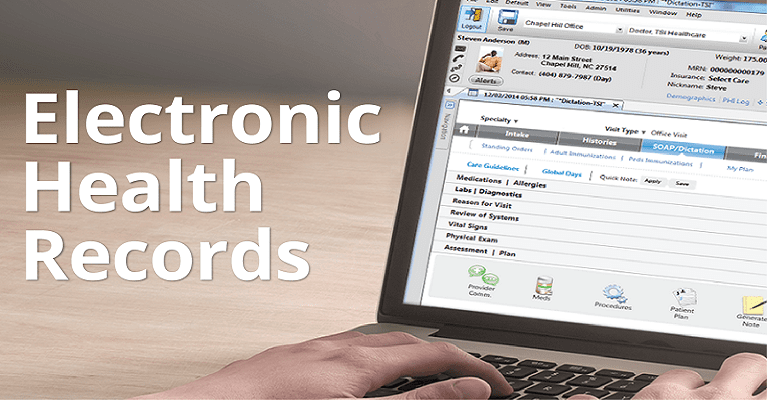Gone are the days when medical practitioners used to maintain patient records manually. The process was not only time-consuming but also prone to human errors. In order to streamline medical procedures and make them more efficient, electronic health records (EHR) were introduced.
What Are Electronic Health Records?
The EHR is a digital version of a patient’s medical history. It contains all important information about a patient’s health, including their medical conditions, medications, and test results.
With time, the healthcare industry has become increasingly reliant on technology. The use of electronic health records has grown exponentially in recent years.
According to Statista, the size of the electronic health records (EHR) market worldwide was estimated at approximately 29 billion US dollars in 2020 and is forecasted to reach over 47 billion US dollars by 2027. This increase can be attributed to the several benefits that EHRs offer in the healthcare industry. Let’s dive deeper into the blog to know more about the benefits.
Key Benefits of Electronic Health Records:
There is no denying that electronic health records are a boon for the healthcare industry. They offer a number of benefits that simply cannot be ignored.
1) Improved Patient Care
One of the most important benefits of EHRs is that they help improve patient care by providing a complete picture of a patient’s medical history. With EHRs, doctors and other healthcare providers can quickly and easily access a patient’s past medical records, which helps in improved patient care.
In addition, EHRs help reduces duplication of medical treatments and improve communication between different members of a patient’s care team.
The Veterans Health Administration (VHA) is the largest integrated healthcare system in the United States, providing care to over 9 million veterans. The VHA’s electronic healthcare record system was integrated across 1,298 healthcare facilities that helped improve the quality of care for veterans.
To quote an example, electronic prescribing allows clinicians to directly communicate with the pharmacy, which can help reduce errors and improve patient safety by eliminating lost prescriptions.
2) Increased Efficiency and Productivity
Healthcare providers are witnessing more patients than ever before while at the same time dealing with shrinking budgets and ever-changing healthcare regulations.
Healthcare software development services empower healthcare-oriented companies with EHRs that help increase efficiency and productivity as they provide a centralized location for all of a patient’s medical information. This can save time when doctors are trying to track down test results or past treatment history.
Also, EHRs often include decision support systems like clinical guidelines and reminders that can help improve medical care. Moreover, it helps physicians make more informed decisions about diagnosis and treatment and also improves communication between healthcare workers. This can further lead to better coordination among them.
3) Act as a Tool for Preventive Health
EHR is an important tool in preventive healthcare as it provides a complete and up-to-date record of a patient’s health. This, in turn, allows for better decision-making when it comes to preventive measures. The healthcare software development services allow for the development of EHR systems that are tailored to the specific needs of the healthcare organization.
For example, if a patient has a family history of heart disease, their EHR would flag this up to their doctor. Who could then recommend lifestyle changes or additional tests as a part of their preventative care plan?
In addition, EHR can also be used to track population health trends which can help to identify at-risk groups and target preventive measures accordingly. Ultimately, EHR has the potential to make a real difference in the field of preventive healthcare.
4) Enhance Patient Privacy and Security
As reported by Statista, there were 330 data breaches in the US healthcare sector in 2021. This number has grown since 2005, when there were a total of 16 data breaches in the country.
The electronic health record (EHR) is a digital version of a patient’s medical history. It contains important information about a patient’s health, such as their medical conditions, medications, and immunizations. The privacy and security of patient data are of the utmost importance in the healthcare industry. Because, if this information falls into the wrong hands, it could be used to exploit patients or commit identity theft.
HIPAA-compliant healthcare solutions such as EHR systems are equipped with a number of features that help protect the privacy and security of patient data. EHRs keep patients’ data private through the use of user authentication. This ensures that only authorized users can access the system and view patient information.
In addition, EHRs use encryption to protect data from being accessed by unauthorized individuals. It means that even if someone needs to gain access to the system, they would not be able to read the data unless they had the proper decryption key. This, in turn, helps protect patient privacy and safeguard their personal information.
5) Reduce Medical Errors
Medical errors are of serious concern in the healthcare industry. In fact, a study published by PubMed states that medication errors alone account for 7000 to 9000 deaths in the US per year. One of the main reasons for this is that paper records are often difficult to read and interpret. This can lead to mistakes being made when medications are prescribed, or dosages are calculated.
However, EHRs help reduces the risk of medical errors. This is due to the fact that EHRs provide a clear and concise record of a patient’s medical history. Making it easier for doctors and nurses to access the medical information they need. Moreover, electronic health records can help flag potential drug interactions and allergies, providing another layer of protection against medication errors.
6) Support Research and Data
Clinical research is a vital part of the healthcare industry. It helps to improve our understanding of disease and identify new and better ways to treat it. Electronic health records (EHRs) play an integral role in clinical research by providing a large pool of data that can be used to identify health trends and patterns.
In addition, EHRs can be used to track medical outcomes and compare different treatment options. This data can then be used to inform future research and improve the quality of care that patients receive. Ultimately, EHRs have the potential to support and improve healthcare research greatly.
For example, if a new drug is released and EHR is used to track the outcomes of patients who take the drug, it becomes easy to identify any potential side effects. This information is then used to improve the safety of the drug or to develop new and better treatments.
Ultimately, by leveraging EHR data, clinical researchers gain a better understanding of the complex factors that contribute to disease progression and identify effective ways to improve it.
Closing thoughts:
The healthcare industry is ever-changing, and it can be difficult to keep up with the latest trends. However, electronic health records are a boon for healthcare workers and patients as well. By implementing an EHR system in your healthcare institution. Now, you will be able to improve communication between staff, speed up service times, and make life easier for your patients.




